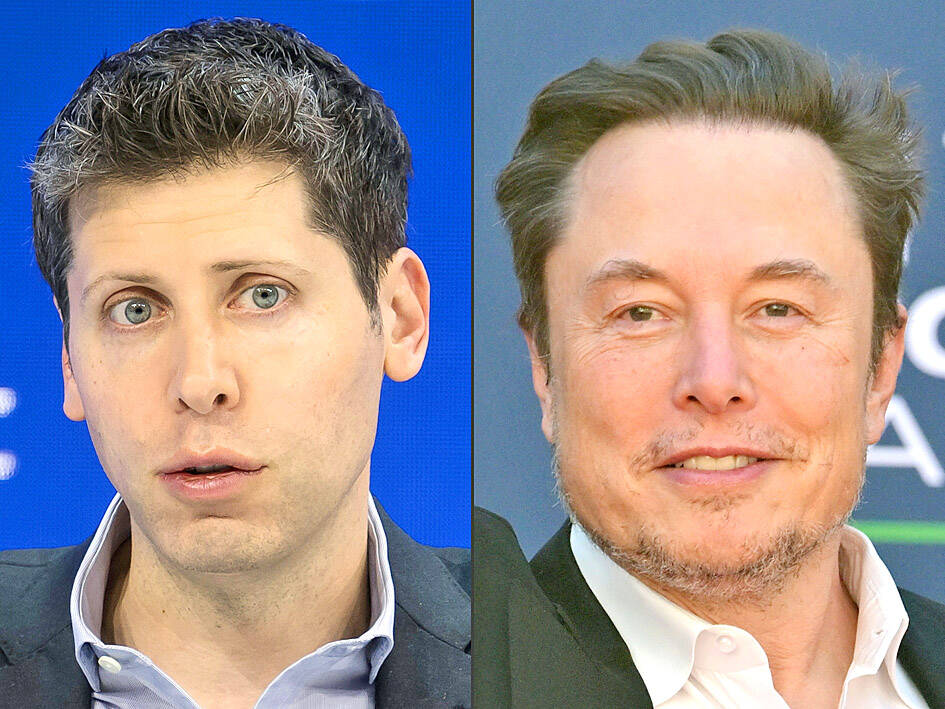A group of investors led by Elon Musk has offered to buy the nonprofit that controls OpenAI for US$97.4 billion, escalating a clash between the Tesla Inc chief executive and the artificial intelligence (AI) company he cofounded.
With the unsolicited bid, Musk said in a statement that he hoped to return OpenAI to being “the open-source, safety-focused force for good it once was.”
In response, OpenAI CEO Sam Altman posted on Musk’s X social-media platform: “No thank you but we will buy twitter for US$9.74 billion if you want.”

Photo: AFP
Musk acquired Twitter for US$44 billion, but its value later diminished, according to outside estimates.
The bid is being backed by Musk’s own AI start-up xAI, which could merge with OpenAI following a deal, the Wall Street Journal reported.
According to a statement from Marc Toberoff, a lawyer representing the investors, other backers of the proposal include Valor Equity Partners, Baron Capital, Atreides Management, Vy Capital, Joe Lonsdale’s 8VC and Ari Emanuel, through his investment fund.
It is difficult to determine how serious Musk’s bid is and what his motivation was for making it, Telluride Legal Strategies LLC founder Rob Rosenberg said.
Even if it is not successful, Musk’s move could potentially complicate OpenAI’s effort to transition from being a nonprofit entity into a multibillion-dollar for-profit AI giant — a transformation Musk has opposed.
“I think he’s trying to make a statement and bring more attention to the fact that OpenAI is still on this course to switch from being a nonprofit to a for-profit company,” Rosenberg said.
In the statement, Toberoff indicated one motivation for the bid: to place outside pressure on OpenAI while it determines a value for parts of its business while transitioning to a for-profit entity.
“That value cannot be determined by insiders negotiating on both sides of the same table,” he wrote. “After all, the public is OpenAI Inc’s beneficiary, and a sweetheart deal between insiders does not serve the public interest.”
Musk and Altman have been locked in a long-standing feud over the direction that OpenAI has taken since its founding. Musk has alleged that the start-up has abandoned all pretense of proceeding as a charity to benefit humanity with a focus on openness and safety.
OpenAI has rejected that characterization, and last year said that Musk was lashing out after an earlier failed attempt to make the company part of his automaker Tesla.

TAKING STOCK: A Taiwanese cookware firm in Vietnam urged customers to assess inventory or place orders early so shipments can reach the US while tariffs are paused Taiwanese businesses in Vietnam are exploring alternatives after the White House imposed a 46 percent import duty on Vietnamese goods, following US President Donald Trump’s announcement of “reciprocal” tariffs on the US’ trading partners. Lo Shih-liang (羅世良), chairman of Brico Industry Co (裕茂工業), a Taiwanese company that manufactures cast iron cookware and stove components in Vietnam, said that more than 40 percent of his business was tied to the US market, describing the constant US policy shifts as an emotional roller coaster. “I work during the day and stay up all night watching the news. I’ve been following US news until 3am

UNCERTAINTY: Innolux activated a stringent supply chain management mechanism, as it did during the COVID-19 pandemic, to ensure optimal inventory levels for customers Flat-panel display makers AUO Corp (友達) and Innolux Corp (群創) yesterday said that about 12 to 20 percent of their display business is at risk of potential US tariffs and that they would relocate production or shipment destinations to mitigate the levies’ effects. US tariffs would have a direct impact of US$200 million on AUO’s revenue, company chairman Paul Peng (彭雙浪) told reporters on the sidelines of the Touch Taiwan trade show in Taipei yesterday. That would make up about 12 percent of the company’s overall revenue. To cope with the tariff uncertainty, AUO plans to allocate its production to manufacturing facilities in

Six years ago, LVMH’s billionaire CEO Bernard Arnault and US President Donald Trump cut the blue ribbon on a factory in rural Texas that would make designer handbags for Louis Vuitton, one of the world’s best-known luxury brands. However, since the high-profile opening, the factory has faced a host of problems limiting production, 11 former Louis Vuitton employees said. The site has consistently ranked among the worst-performing for Louis Vuitton globally, “significantly” underperforming other facilities, said three former Louis Vuitton workers and a senior industry source, who cited internal rankings shared with staff. The plant’s problems — which have not

COLLABORATION: Given Taiwan’s key position in global supply chains, the US firm is discussing strategies with local partners and clients to deal with global uncertainties Advanced Micro Devices Inc (AMD) yesterday said it is meeting with local ecosystem partners, including Taiwan Semiconductor Manufacturing Co (TSMC, 台積電), to discuss strategies, including long-term manufacturing, to navigate uncertainties such as US tariffs, as Taiwan occupies an important position in global supply chains. AMD chief executive officer Lisa Su (蘇姿丰) told reporters that Taiwan is an important part of the chip designer’s ecosystem and she is discussing with partners and customers in Taiwan to forge strong collaborations on different areas during this critical period. AMD has just become the first artificial-intelligence (AI) server chip customer of TSMC to utilize its advanced